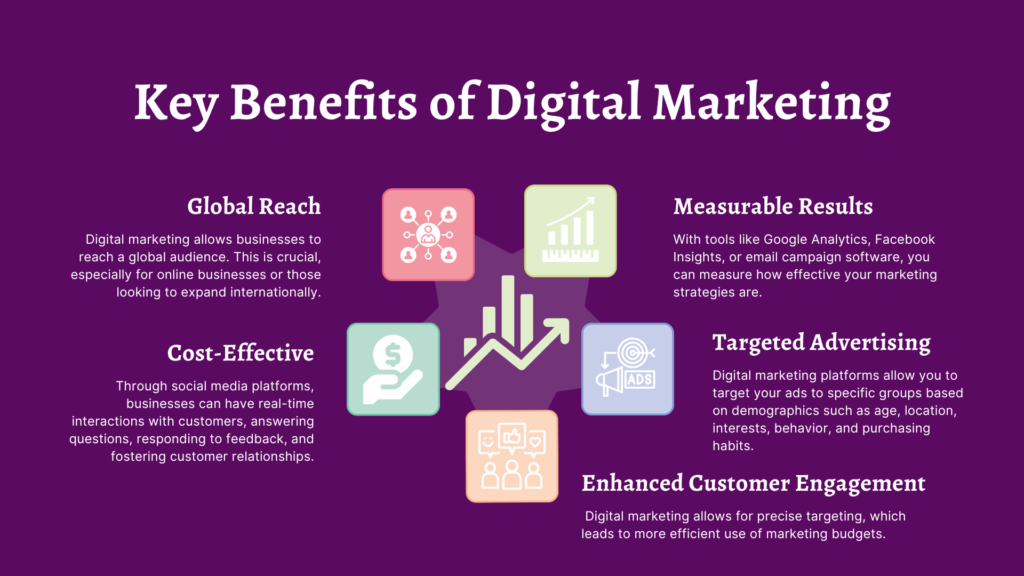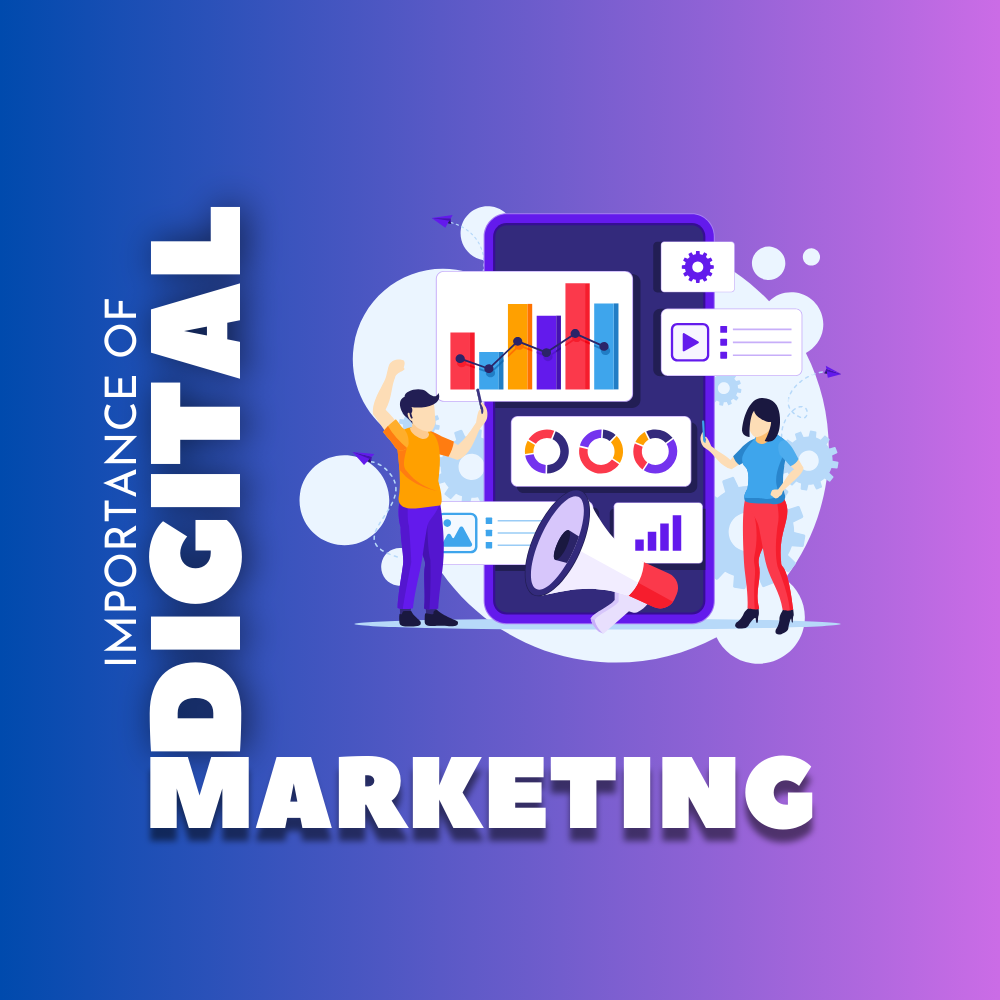In today’s digital age, the way businesses reach their customers has changed dramatically. Digital marketing provides businesses with the tools they need to adapt to this change and stay competitive. Whether your target audience is local or global, digital marketing offers a variety of strategies to promote your business, connect with customers, and increase sales.
What is Digital Marketing?
Digital marketing is the use of digital channels and platforms to promote products or services. This includes methods such as SEO (Search Engine Optimization), social media, email marketing, PPC (Pay-Per-Click), and content marketing. Unlike traditional marketing (TV, radio, print), digital marketing provides real-time insights and feedback, allowing businesses to adjust their strategies quickly for better performance.
The Key Benefits of Digital Marketing

1. Global Reach
- Expansion Beyond Geographical Boundaries: Digital marketing allows businesses to reach a global audience. This is crucial, especially for online businesses or those looking to expand internationally. With the internet, there’s no limit to where your business can be visible.
- Accessibility for Smaller Businesses: Even small businesses can reach customers from different parts of the world. You are no longer limited to your local market, giving you an edge over competitors who only focus on traditional marketing.
2. Cost-Effective
- Lower Costs Compared to Traditional Marketing: Traditional marketing methods like TV commercials, print ads, or billboards can be very expensive. Digital marketing is much more affordable and offers the flexibility to scale your budget based on your needs.
- Better ROI: Digital marketing allows for precise targeting, which leads to more efficient use of marketing budgets. By focusing on what works best (like social media ads or email campaigns), you can maximize your return on investment (ROI).
3. Measurable Results
- Analytics and Tracking Tools: With tools like Google Analytics, Facebook Insights, or email campaign software, you can measure how effective your marketing strategies are. You can track metrics like website traffic, bounce rates, conversion rates, and more.
- Data-Driven Decisions: The ability to measure and analyze performance allows you to make informed decisions. This means you can optimize your strategies in real-time to improve results and focus on campaigns that generate the most leads or conversions.
4. Targeted Advertising
- Focus on Relevant Audiences: Digital marketing platforms allow you to target your ads to specific groups based on demographics such as age, location, interests, behavior, and purchasing habits. This ensures that your message is seen by the people most likely to convert into customers.
- Personalized Marketing: Businesses can now personalize their ads and content based on user behavior, making marketing efforts more effective. For example, if someone has previously visited your website, you can retarget them with a personalized ad.
5. Enhanced Customer Engagement
- Two-Way Communication: Through social media platforms, businesses can have real-time interactions with customers, answering questions, responding to feedback, and fostering customer relationships.
- Increased Customer Loyalty: Regular engagement helps build a loyal customer base. By maintaining a presence on social media, creating valuable content, and offering customer support online, businesses can build trust and keep their audience engaged.
Types of Digital Marketing
1. Search Engine Optimization (SEO)
- What is SEO: SEO is the process of optimizing your website to rank higher on search engine results pages (SERPs). By using relevant keywords, building backlinks, and improving the user experience, you can increase organic traffic to your website.
- Why is SEO Important: Most consumers begin their purchasing journey with an online search. SEO ensures that your website is visible when potential customers are searching for products or services that you offer.
2. Social Media Marketing
- What is Social Media Marketing: This involves using social media platforms like Facebook, Instagram, Twitter, and LinkedIn to promote your business. Social media marketing allows businesses to engage with their audience, create brand awareness, and drive traffic to their website.
- Why is it Effective: Social media platforms have billions of users. With a good social media strategy, businesses can connect with their target audience on a personal level, build brand loyalty, and even turn followers into customers.
3. Email Marketing
- What is Email Marketing: Email marketing involves sending targeted messages to a list of subscribers. These emails can include promotional offers, newsletters, updates, and more.
- Why is it Effective: It’s one of the most cost-effective forms of digital marketing. Personalized emails have a high conversion rate and can be used to nurture leads, upsell to existing customers, and drive repeat business.
4. Pay-Per-Click (PPC)
- What is PPC: PPC is an advertising model where businesses pay for each click on their ads. These ads appear on search engines or social media platforms and can drive immediate traffic to a website.
- Why is PPC Important: It provides quick visibility and can be very effective for generating leads, especially when you’re targeting specific keywords. Businesses can set a budget and only pay when someone clicks on their ad.
5. Content Marketing
- What is Content Marketing: Content marketing is the creation and distribution of valuable content to attract and engage a target audience. This can include blog posts, videos, infographics, and eBooks.
- Why is it Effective: High-quality content not only drives traffic but also helps establish your business as an authority in your industry. Engaging content can boost your SEO efforts, increase customer trust, and drive conversions.
Why Your Business Needs Digital Marketing
- Online Visibility: With most consumers starting their buying journey online, having a digital presence is essential. Without digital marketing, your business will be invisible to potential customers who are actively searching for products or services like yours.
- Competitor Advantage: Many of your competitors are already using digital marketing to drive traffic and sales. Not investing in digital marketing means you’re giving your competitors an advantage, as they are already engaging with the online audience.
- Improved Conversion Rates: By targeting the right audience with the right message at the right time, digital marketing strategies such as SEO, PPC, and social media ads increase the likelihood of converting website visitors into paying customers.
- Adaptability: Digital marketing strategies can be adjusted in real-time. If a campaign isn’t performing well, you can make adjustments immediately, ensuring better use of your marketing budget and more successful campaigns.
Conclusion
In conclusion, digital marketing is a powerful tool for any business looking to grow its online presence, reach more customers, and stay competitive in today’s digital landscape. With a variety of tools and strategies, digital marketing offers measurable, cost-effective ways to drive traffic, generate leads, and increase sales. Whether you’re running a small local business or a large corporation, digital marketing can help you achieve your business goals.
FAQs
1. What is the main purpose of digital marketing?
The main purpose of digital marketing is to promote products or services using digital channels such as search engines, social media, and email to reach and engage with a target audience.
2. How does digital marketing help businesses grow?
Digital marketing helps businesses grow by increasing their online visibility, generating more leads, improving customer engagement, and offering measurable results that can be optimized over time.
3. Is digital marketing suitable for small businesses?
Yes, digital marketing is especially suitable for small businesses because it provides cost-effective ways to reach a larger audience and compete with bigger companies, without needing a large marketing budget.
4. How can I measure the success of my digital marketing campaigns?
You can measure success through KPIs (Key Performance Indicators) such as website traffic, conversion rates, engagement rates, and ROI. Tools like Google Analytics, social media insights, and email marketing platforms provide valuable data to track performance.
5. Which type of digital marketing is the most effective?
The most effective type of digital marketing depends on your business and its goals. However, SEO, content marketing, and social media marketing are generally effective for most businesses as they provide long-term value and high engagement rates.an significantly boost your business’s growth.


Comments are closed